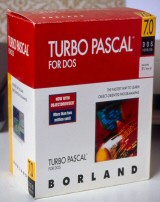 Eventually, after a long agony, Borland died. Actually, it was acquired by Micro Focus, and I do not believe the brand will survive. Especially now that all of its product portfolio is made up by product born elsewhere and acquired in the past few years. The products that made the Borland name were already sold in the past. When the development tools division was bought one year ago by Embarcadero, it was clear that the Borland saga was at the end. I just wish it happened while really fighting back, instead of the slow decay of the past years, when flagship products like Delphi were sacrified to a new "business model" that led to nowhere.
Eventually, after a long agony, Borland died. Actually, it was acquired by Micro Focus, and I do not believe the brand will survive. Especially now that all of its product portfolio is made up by product born elsewhere and acquired in the past few years. The products that made the Borland name were already sold in the past. When the development tools division was bought one year ago by Embarcadero, it was clear that the Borland saga was at the end. I just wish it happened while really fighting back, instead of the slow decay of the past years, when flagship products like Delphi were sacrified to a new "business model" that led to nowhere.
It is true, that at the end of the '80, when the Borland Barbarians looked unstoppable, so much they were so bold to take on Microsoft, something changed, and a long queue of mistakes began. The useless Ashton-Tate acquisition, the ill-fated alliance with WordPerfect to sell an office suite, the inability to understand user segments and manage their product portfolio - Paradox users were not TurboPascal/C++ users, OOP was too complex for the former, SideKick could have been turned into a PIM/messaging application but didn't -, and time/resources wasted in products like ObjectVision instead of pursuing Visual Basic RAD approach immediately. Perhaps Borland became already too much complacent, and like many other Microsoft competitors, undervalued Windows and kept on to invest too much resources in DOS products. Users switched to Windows (and the ready Microsoft applications) much faster than most Microsoft competitors did - Borland was not alone, Lotus and Wordperfect made the same mistake - the few who understood in time, say Adobe, are still alive.
It looked they could regain the older status when Delphi was released - although a bit too late, probably - but both Microsoft harvesting the best Borland developers, and lack of proper positioning of the product itself - Borland tried to aim it at Visual Basic developers, but many preferred the less powerful but easier (and Microsoft branded) tool, especially enterprise developers - although Delphi was successful in smaller shops where its ability to write its own components (VBX/ActiveX had to be written mostly in C/C++) and native compiled executables with far less dependencies were much appreciated.
Bad marketing, a couple of so-so releases, lack of a proper vision when the Internet boomed, silly name changes, and the uncertain future of the company itself never let Delphi achive the position it deserved - and maybe save Borland.
Reduced to a "development tools company", Borland received the fatal blow when bigger companies understood that IDEs are a good bait to drive expensive hardware, OS, databases and middleware sales. On one side IBM undestood the open source community could be lured to develop something far better than the "designed-by-commitee" VisualAge, on the other side MIcrosoft started to deliver cheap or free entry level Visual Studio versions. Both were making lots of money selling other products, and it was difficult for Borland to counter them - because its own revenues came wholly from the tools the other could give away for free, or almost. The "open" architecture of the products and the availability of many excellent third party libraries made even more difficult to release entry level versions that couldn't be used for "professional" development easily.
Again Borland management lacked a proper vision, and started to release "standard" entry-level version - no, free versions - o no, it was a mistake again, no free/entry level version at all! - while the professional versions became more and more expensive, hindering new young and casual developers to approach the product, which was what made TurboPascal so widespread. And while in the Windows world IDEs are not "commoditized" at all - many companies still buy expensive Visual Studio versions because free ones have limitations, the price/feature ratio of Delphi became far less appealing because development slowed down due to lack of commitment, because focus was moved to the ALM stuff, in the hope to enter a market with far greater margins. Unluckly, they were not able to use their own IDEs to drive the ALM products adoption, it was too late. The end was nearer and nearer.
It's sad, because Borland was one of the few companies that really shaped the early PC days, in several different facets, from development tools to utility and office applications, and allowed many of us to enter the IT world. Although the recent Borland and its products didn't resemble the old one at all. For those who began their professional development career staring one day at a black TurboPascal screen, and once discovered the language and keystrokes shouted "cool!", the demise of the Borland name is melancholy.
Well, the Golden Rush is over, Frank Borland vanished in the sunset - all good things come to an end.